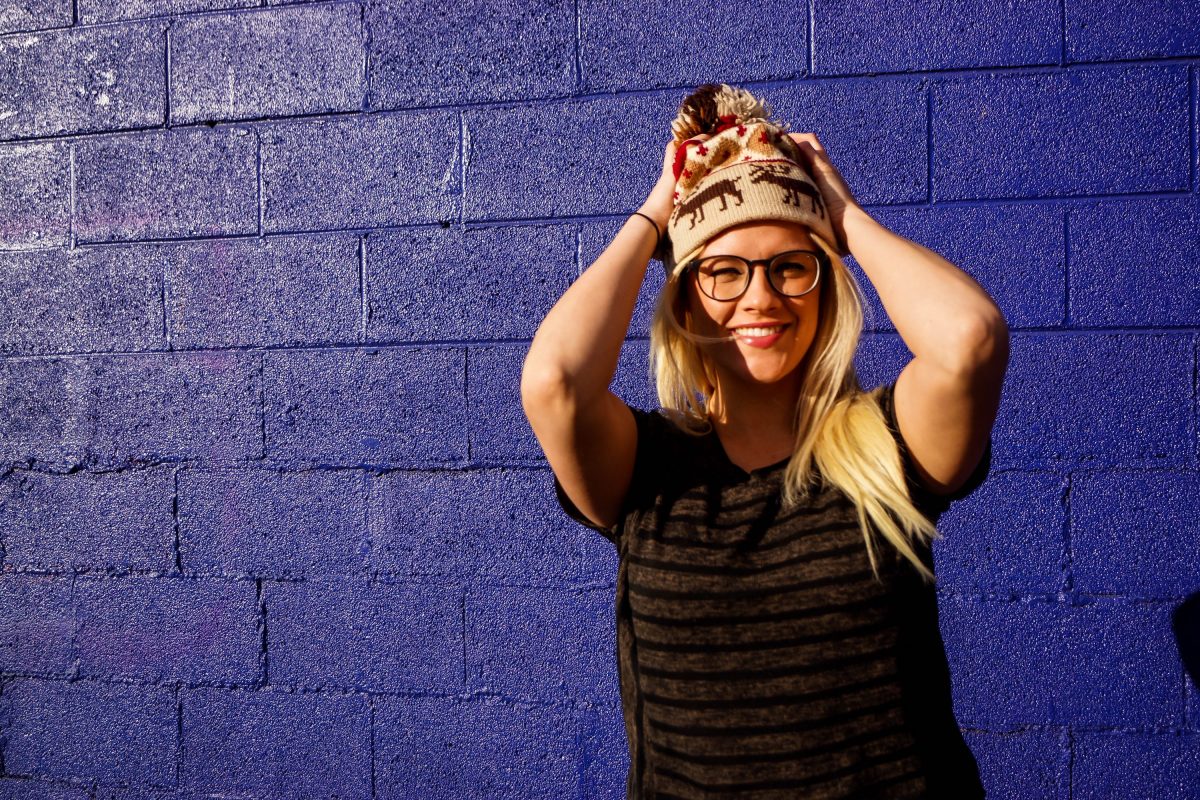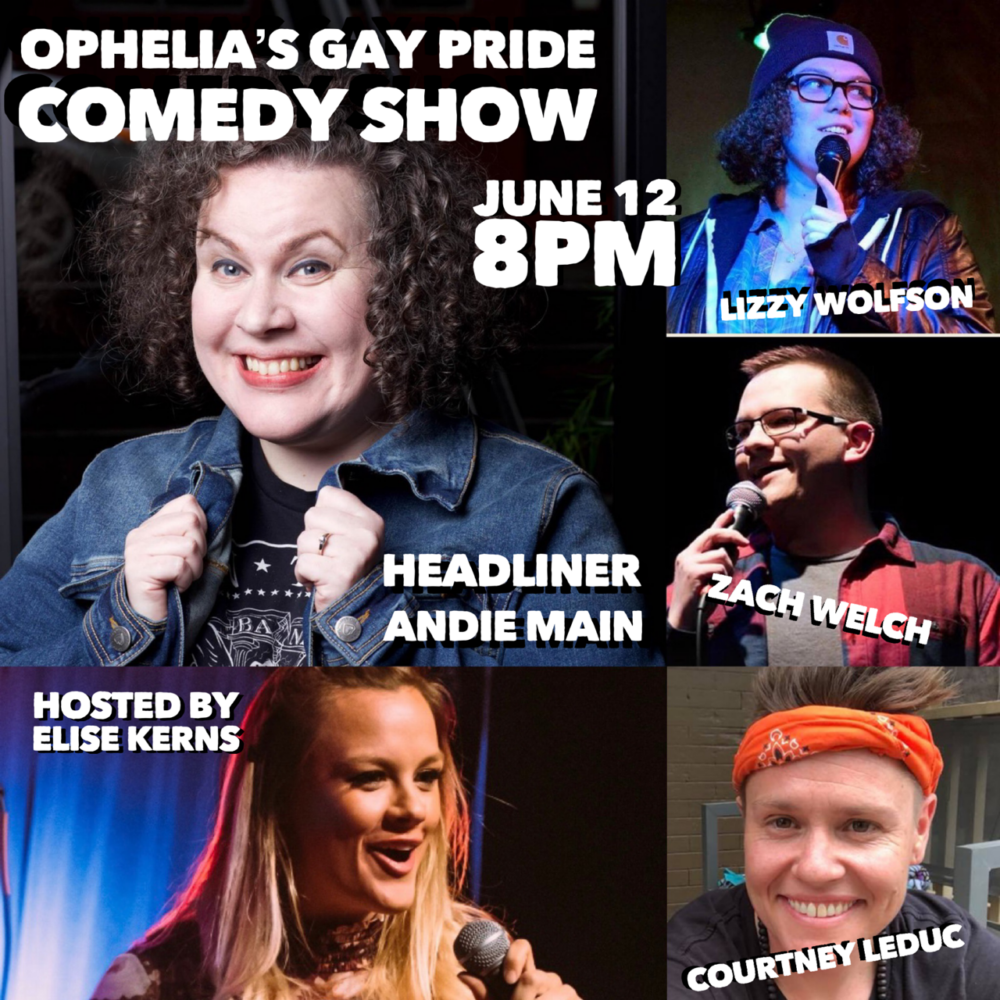The Cheez-It Salad Elise Kerns will Never Forget

Intersectionality, accessibility, and squashing the sexist, patriarchal norms through queer…
Being in the business of laughs is a family affair for Elise Kerns. Growing up with comedian Rick Kerns as a father gave her an insatiable desire to get under the spotlight herself, and in the short time she has been taking the microphone, she has been catching audiences by the funny bone.
Now hosting the bi-monthly stand-up comedy showcase Get Thee to A Nunnery at Ophelia’s Electric Soapbox, this queen of humor embraces her queerness and is boldly sharing her story. In preparation for the upcoming LGBTQ showcase takeover in June, and just in time for Pride, OUT FRONT got the chance to chat with Elise and hear, in her own words, the ups and downs of a career in the fast lane.
Things have been really taking off for you in the world of comedy over the last year!
Yeah, I feel like things have happened pretty fast. They say that you have to suck your first year doing comedy, and that has absolutely been true a little bit you know. I bomb just like everybody else bombs, but, I mean, I did some really cool things last year. I performed at Fiddler’s Green Amphitheater for Channel 93.3’s ‘Big Gig’ for thousands of people, which was super cool. And then I got to open for Dan Savage’s live podcast recording last year in May, which was 100 percent the coolest thing I’ve ever done. I’ve read Savage Love since I was in middle school; I listened to his podcast religiously, he’s totally one of my heroes, so that was really cool.
Why did you decide to pursue comedy at this time in your life?
My dad is a stand-up comic, so I grew up around it. The first time I went on stage was at Comedy Works when I was four years old. I would rather go to a live comedy show than do anything else; I’ve always felt that way about it. I got the itch to do it when I was 20 years old, and then I stopped for a few years, but I just had to do it again.
What was the reason you took a break from stand-up comedy?
I actually have a joke about this, because you have to joke about things that are painful, awkward, and weird, but my dad made me stop doing it. He has had difficulties with drugs and alcohol, and he absolutely blames stand-up comedy for that lifestyle. He’s not wrong; I mean, it’s definitely kind of like living the ‘rockstar’ lifestyle. You’re on the road all the time; you barely have any money, and you get paid in drink tickets. So, you have to really hold yourself accountable to not go down that road.
As a parent, I think you want to see your kid not make the same bad choices that you made, so I think he was just trying to protect me from it. I resented him for years, but I absolutely get why he wasn’t supportive of it. Then, two years ago, I wrote a really long text about how it was in me, it was something I needed to do, and he’s been super supportive ever since.
Where do you draw your inspiration from?
I don’t want to be too general and say that I pull from everyday life, but I can’t even tell you how many times a day I open notes in my phone and jot down something someone said, something that happened, or something that I saw. It’s usually just a premise, and then I’ll read it back later and see where I can go with it.
Sometimes I won’t know what I meant if I don’t read it for a few days… like, I have a note in my phone that says ‘Cheez-It salad,’ and I have had it in there for years. It drives me absolutely crazy because I know that it was really funny, and I can’t remember what it means!
I have a lot of jokes about being gay. There are very few female voices in comedy already, and even fewer queer female voices, and even fewer feminine queer female voices. So I like to give my perspective on that. I do think that stereotypes are unfortunate; however, it’s fun to play with them a little bit.

What kind of challenges do you face as a queer woman in comedy?
Being a female comedian is already hard. We see this issue in the Denver comedy scene, and comedy in general right now, and I know that it’s also an issue in music and the arts in general, that we are sort of undermined and not looked at as being as funny. I’ve heard people say, ‘You’re really funny for girl,’ you know, like people don’t think women are funny.
But, to be honest, I don’t feel that I have experienced any issues being queer in the comedy scene. I feel that much more embraced. I feel like I get booked more on shows, because I think that people want more diversity in their shows now. I think a lot of times we have this idea that we have to rise above because we’re a unique voice when actually that’s what people are wanting to hear.
Did you ever consider not coming out to audiences and including that part of your life in your stand-up material?
The first few jokes I wrote, the first five minutes of material that I had, didn’t have any jokes about being gay. A fellow comedian and friend sort of pointed out that it was weird, because it’s such a big part of my life. You have to talk about what you know, but I think that I was scared. It’s the same feeling as coming out to your parents; I was scared of how those jokes would be received, even in 2017 and 2018.
We’ve come so far, but it’s sort of scary to stand on stage and think that there could be someone in the audience who’s going to stand up and yell a derogatory, gay term at you because they’re offended. But, it was just so well-received the first time I did a gay joke that I never looked back. I feel like that’s sort of the majority of my act now, because I feel so comfortable in who I am that I’m not scared anymore to tell my story.
How does the Denver comedy scene compare to the rest of the country?
I think that Denver is known across the country as one of the most supportive scenes, as one of the best scenes. We’ve turned out a lot of really great comics here, and all I’ve ever heard from people from other states is that people move here all the time because they want to be a part of this comedy community. I’ve only done a few shows here and there in other cities, but I definitely don’t notice a camaraderie between the comics like we have here. It’s really special, what we have here.
Why do you think comedy is so important?
Well, right off the bat I’ll say the most cliche thing, which is that laughter is the best medicine, but I think that is so often said because it’s true. I don’t feel like there’s anything that can change a person’s day like going to a comedy show and having someone make your belly hurt because you’re laughing so hard.
I also think comedy, and especially stand-up comedy, does something really special, which is that you’re able to get a really important point across but make it funny. I feel like maybe it’s boring to read an article about gun control, but when Jim Jeffries does his 15-minute bit about it, yes he’s making jokes. but still he’s making good points. I think that’s a good way to grab people’s attention and make them pay attention to something that’s important.
What is the difference between being a comedian and simply being a funny person?
It’s the work that you are willing to put in; stand-up comedy is not easy. I know people who go to open mics seven days a week, and they hit several of them in one night. That right there is the difference between being funny and being a comedian, it’s how much effort you’re willing to put into your craft. It doesn’t matter if you have the funniest jokes in the world, if you don’t know how to hold the microphone, and you don’t know how to control your voice on stage, you’re not going to sound good or be appealing at all. It’s really just work ethic, desire, and absolutely natural ability as well.

What's Your Reaction?
Intersectionality, accessibility, and squashing the sexist, patriarchal norms through queer pearls of wishful wisdom.







